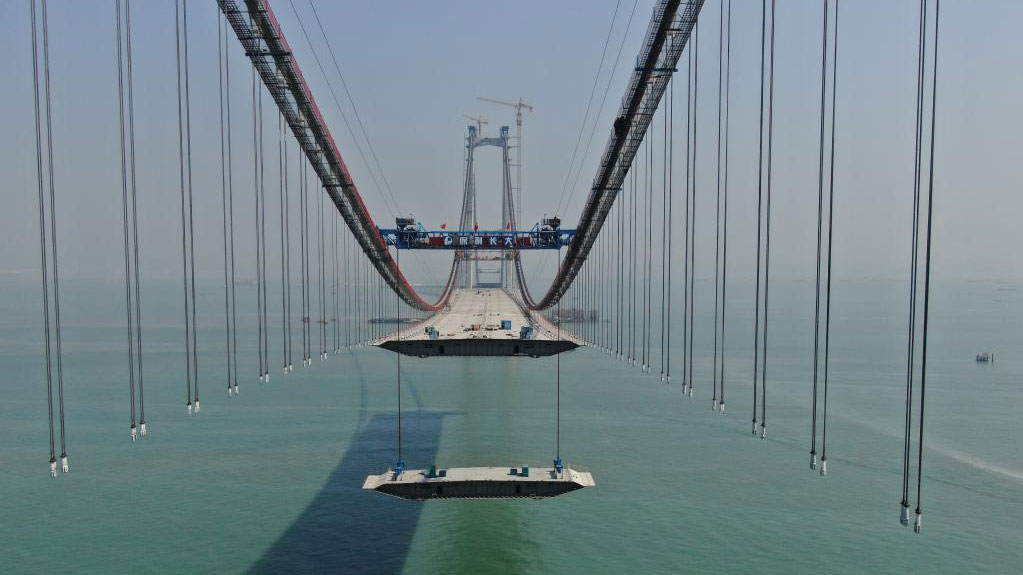Why U.S. overreaction to Chinese airship is ludicrous, dangerous?
BEIJING, Feb. 25 (Xinhua) -- Despite China's repeated explanation that the entry of a Chinese civilian unmanned airship into U.S. airspace was an entirely unintended, unexpected and isolated event caused by force majeure, the United States, without any evidence, slandered the airship as a "spy balloon" and abused force to shoot it down.
Washington's "unthinkable and hysterical action" blatantly violated its obligations under the Chicago Convention and many basic principles of international law, as some U.S. politicians insisted on such absurd things only for their own political need at the expense of China-U.S. relations.
ABUSE OF FORCE
Weather balloons are regularly launched around the world for weather forecasting and scientific research. Every day, free-rising latex balloons are released from almost 900 locations worldwide, with nearly 1,000 balloons gathering daily observations that provide input in real-time, the UN World Meteorological Organization counted.
However, in the first two weeks of February, U.S. fighter jets shot down four objects flying over North America, including the Chinese civilian balloon that the Pentagon said "does not present a military or physical threat to people on the ground," or a significant risk of intelligence collection.
U.S. President Joe Biden on Thursday also admitted the other three objects were "most likely tied to private companies, recreation or research institutions."
"A lot of balloons are flying over the Earth every day. Does the U.S. want to shoot them all down?" senior Chinese diplomat Wang Yi raised the question on the sidelines of the 59th Munich Security Conference.
Washington's drastic reaction to the weather balloon not only goes against scientific common sense, but also violates customary international practice and conventions.
Above all, any international dispute shall be settled by peaceful means so that international peace, security and justice are not endangered, according to the UN Charter.
Based on general principles of international law, in the circumstances of force majeure, distress and necessity, aircraft unauthorized to enter other countries' airspace shall be exempt of legal liability.
Since last year, U.S. balloons have illegally flown over China's airspace more than 10 times without the approval of relevant authorities. But China handled those illegal flights in a calm and professional manner. That has demonstrated Beijing's respect for international law and sincerity in properly managing China-U.S. relations.
As far as the "stray balloon" is concerned, China has clearly asked the U.S. side to properly handle the matter in a calm, professional and restrained manner, whereas the United States used "the most advanced U.S. weapons systems" -- as depicted by The Washington Post -- to eliminate the object.
Clearly, Washington has resorted again to double standards. In 2016, China seized an unmanned underwater vehicle (UUV) -- later claimed by the Pentagon -- in the South China Sea to prevent it from harming navigational and personnel safety of passing ships. The U.S. Defense Department called on China to "return our UUV immediately and to comply with all of its obligations under international law." Its urge stands in sharp contrast with its downing of the four civilian aerial objects.
SUPERPOWER OF SURVEILLANCE
The United States, as a superpower of surveillance, has a long history of sending surveillance balloons and blimps beyond its borders to gather intelligence. That helps explain why the ill-grounded "spy balloon" narrative can raise mass hysteria in U.S. media and political community.
Before the Lockheed U-2 reconnaissance aircraft and spy satellites came into service, the U.S. Air Force had developed reconnaissance balloon programs known as WS-119L and WS-461L for the mission of collecting intelligence over Eastern Europe and the Soviet Union between the late 1950s and early 1960s.
Nowadays, as the center of gravity for global Internet and intelligence activity, the United States has further consolidated its privileged position to monitor. Among the countries it snoops on is China, which has been harassed by U.S. spy devices multiple times over the past few years.
The Chinese Foreign Ministry confirmed in June 2022 that the United States has deployed many military aircraft and warships in the South China Sea on a regular basis and its reconnaissance aircraft have electronically impersonated civil aircraft of other countries there time and again.
The ministry said, citing statistics from institutions with professional knowledge, that the number of the U.S. close-in military reconnaissance missions against China has more than doubled compared with a decade ago.
In September last year, China's National Computer Virus Emergency Response Center and cybersecurity company 360 respectively released investigation reports on the attacks on China's Northwestern Polytechnical University from the U.S. National Security Agency (NSA), which showed that the agency's Tailored Access Operations unit mounted hundreds of thousands malicious cyberattacks targeting Chinese objectives.
Permeating through every part of the world, the U.S. surveillance network also targets Washington's allies.
In May 2021, Denmark's national broadcaster DR News reported that the Danish Defense Intelligence Service had given the NSA open Internet access to spy on targeted heads of state, as well as Scandinavian leaders, top politicians, and high-ranking officials in Germany, Sweden, Norway and France, including then German Chancellor Angela Merkel.
That was not unfamiliar to European leaders. In 2013, former NSA contractor Edward Snowden revealed that Washington had been spying on the email and cell phone communications of as many as 35 world leaders.
Snowden also disclosed that a U.S. surveillance program codenamed Stateroom ordered the installment of secret intelligence equipment in some 100 foreign diplomatic embassies and consulates in other countries for spying.
"Washington is losing its moral ground," the German magazine Focus once quoted an expert on foreign policy as saying.
With its global surveillance network, "the United States itself is the true eavesdropper," Focus said, though the country prefers to frame itself as a victim of spying.
Photos
Related Stories
- Interview: It's illogical U.S. spends much on wars, very little on infrastructure, says renowned anti-war activist
- Union officials say cost cutting led to significant derailments in U.S.: ABC News
- Omicron subvariant XBB.1.5 accounts for 85 pct new COVID-19 cases in U.S.
- Heat-related deaths hit 20-year high in U.S. Texas last year: report
- US Hegemony and its Perils: China's criticism of U.S. hegemony hits the nail on the head
Copyright © 2023 People's Daily Online. All Rights Reserved.









